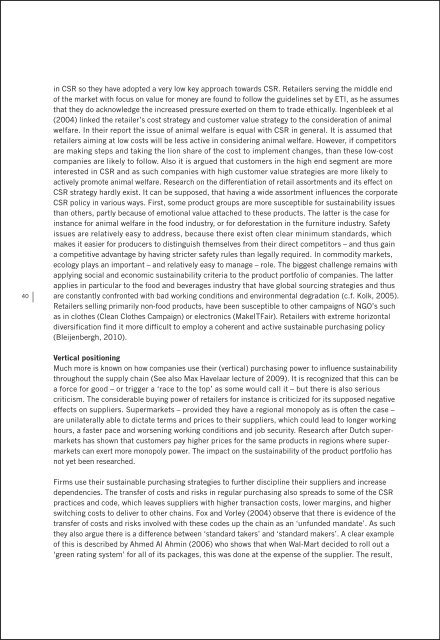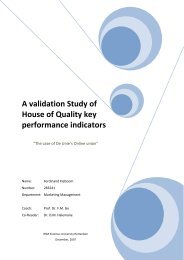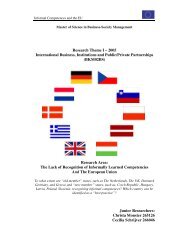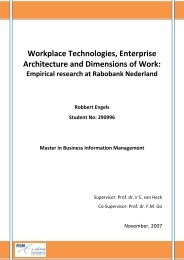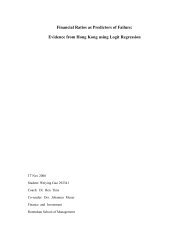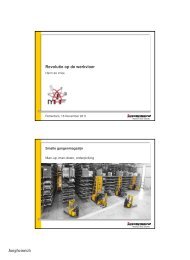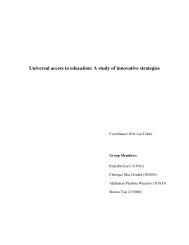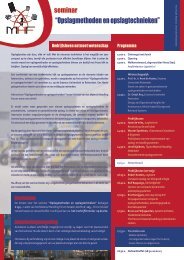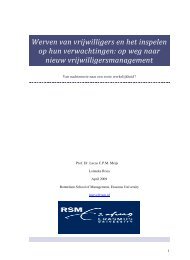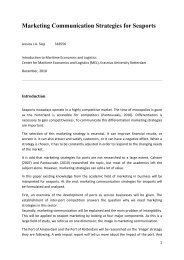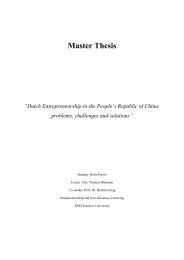Download With great power comes great responsibility (pdf) - ERIM
Download With great power comes great responsibility (pdf) - ERIM
Download With great power comes great responsibility (pdf) - ERIM
Create successful ePaper yourself
Turn your PDF publications into a flip-book with our unique Google optimized e-Paper software.
40<br />
in CSR so they have adopted a very low key approach towards CSR. Retailers serving the middle end<br />
of the market with focus on value for money are found to follow the guidelines set by ETI, as he assumes<br />
that they do acknowledge the increased pressure exerted on them to trade ethically. Ingenbleek et al<br />
(2004) linked the retailer’s cost strategy and customer value strategy to the consideration of animal<br />
welfare. In their report the issue of animal welfare is equal with CSR in general. It is assumed that<br />
retailers aiming at low costs will be less active in considering animal welfare. However, if competitors<br />
are making steps and taking the lion share of the cost to implement changes, than these low-cost<br />
companies are likely to follow. Also it is argued that customers in the high end segment are more<br />
interested in CSR and as such companies with high customer value strategies are more likely to<br />
actively promote animal welfare. Research on the differentiation of retail assortments and its effect on<br />
CSR strategy hardly exist. It can be supposed, that having a wide assortment influences the corporate<br />
CSR policy in various ways. First, some product groups are more susceptible for sustainability issues<br />
than others, partly because of emotional value attached to these products. The latter is the case for<br />
instance for animal welfare in the food industry, or for deforestation in the furniture industry. Safety<br />
issues are relatively easy to address, because there exist often clear minimum standards, which<br />
makes it easier for producers to distinguish themselves from their direct competitors – and thus gain<br />
a competitive advantage by having stricter safety rules than legally required. In commodity markets,<br />
ecology plays an important – and relatively easy to manage – role. The biggest challenge remains with<br />
applying social and economic sustainability criteria to the product portfolio of companies. The latter<br />
applies in particular to the food and beverages industry that have global sourcing strategies and thus<br />
are constantly confronted with bad working conditions and environmental degradation (c.f. Kolk, 2005).<br />
Retailers selling primarily non-food products, have been susceptible to other campaigns of NGO’s such<br />
as in clothes (Clean Clothes Campaign) or electronics (MakeITFair). Retailers with extreme horizontal<br />
diversification find it more difficult to employ a coherent and active sustainable purchasing policy<br />
(Bleijenbergh, 2010).<br />
Vertical positioning<br />
Much more is known on how companies use their (vertical) purchasing <strong>power</strong> to influence sustainability<br />
throughout the supply chain (See also Max Havelaar lecture of 2009). It is recognized that this can be<br />
a force for good – or trigger a ‘race to the top’ as some would call it – but there is also serious<br />
criticism. The considerable buying <strong>power</strong> of retailers for instance is criticized for its supposed negative<br />
effects on suppliers. Supermarkets – provided they have a regional monopoly as is often the case –<br />
are unilaterally able to dictate terms and prices to their suppliers, which could lead to longer working<br />
hours, a faster pace and worsening working conditions and job security. Research after Dutch super -<br />
markets has shown that customers pay higher prices for the same products in regions where super -<br />
markets can exert more monopoly <strong>power</strong>. The impact on the sustainability of the product portfolio has<br />
not yet been researched.<br />
Firms use their sustainable purchasing strategies to further discipline their suppliers and increase<br />
dependencies. The transfer of costs and risks in regular purchasing also spreads to some of the CSR<br />
practices and code, which leaves suppliers with higher transaction costs, lower margins, and higher<br />
switching costs to deliver to other chains. Fox and Vorley (2004) observe that there is evidence of the<br />
transfer of costs and risks involved with these codes up the chain as an ‘unfunded mandate’. As such<br />
they also argue there is a difference between ‘standard takers’ and ‘standard makers’. A clear example<br />
of this is described by Ahmed Al Ahmin (2006) who shows that when Wal-Mart decided to roll out a<br />
‘green rating system’ for all of its packages, this was done at the expense of the supplier. The result,<br />
however, is the same: an increase in part of the sustainability of the chain. In this case the increased<br />
ecological sustainability of the chain is directly linked to a decreased social sustainability of the chain.<br />
In case large and well-positioned companies claim to have a positive CSR influence on their sector<br />
and suppliers, both ecological and social / economic dimensions should have to be taken into<br />
consideration as well. Wal-Mart’s strategy, therefore, remains largely re-active and in defense<br />
of its <strong>power</strong>ful economic chain position which results in rather skewed distributions of profits.<br />
Interesting alliances, however, have appeared between frontrunner supermarkets and a number of<br />
NGOs. Fox and Vorley (2004) state “some of these groups clearly see supermarket <strong>power</strong> as an<br />
advantage for achieving their goals of improving social and environmental conditions (…) because<br />
they only have to deal with a very limited number of gatekeepers to the agrifood system with capacity<br />
to dictate conditions of market entry” (p.6). Moreover, Jones et al (2007) argue that (large) retailers<br />
have “a very active role in driving production and in stimulating and shaping customer demand”<br />
(p.21). Fulponi (2006) acknowledges that food safety standards have developed and harmonised<br />
and due to the buying <strong>power</strong> of retailers this might also occur for other voluntary standards and codes.<br />
As such large retailers that are motivated to integrate CSR could use their <strong>power</strong> to stimulate producers<br />
and customers towards more sustainable products. However, these positive results of increased<br />
concentration and <strong>power</strong> are rarely mentioned and lack strong empirical or theoretical foundations in<br />
retail literature. Finally, it must be noted that according to Lavorate and Pontier (2005) the <strong>great</strong>er a<br />
firm’s size, the <strong>great</strong>er the expectations of the retailer’s ethical outlook. Therefore, large firms should<br />
acknowledge, that they will have to be more ethically involved, than smaller firms.<br />
Constructive competition policy<br />
More active sustainability strategies require certain forms of collaboration. Established competition<br />
policy regimes are primarily aimed at preventing <strong>power</strong> abuse through collusion, which can become a<br />
barrier to further progress if applied to restrictively. This is the tension, for instance, that exists in the<br />
horizontal agreements made in support of higher prices for MSC (Marine Stewardship) certified fish<br />
(Parlevliet, 2010). The Dutch competition policy authority NMA grants exemption for certain types of<br />
collaboration that can lead to improvements in production or distribution. In the past only material<br />
welfare (of consumers) was used as the benchmark for effective completion, It is expected that in<br />
the future also social and other non-material welfare dimensions will be included, in the reasons for<br />
exemption. The NMA at the moment acknowledges this already, but requires that the agreements<br />
provides advantages for consumers, is limited in scope and sustains sufficient competition.<br />
The European Competition Policy authorities seem to be more restrictive in this area. Nevertheless,<br />
the actual implementation of exemption rules remain strongly contested, not only by hard-line neoliberals,<br />
but also by scholars (like Parlevliet) who doubt that horizontal price agreements are a<br />
necessary condition for sustainability in chains. Many of them argue that in case government takes<br />
up an active role – which in the case of fish is for instance the effective organization of fish quota –<br />
no MSC labeling is required.<br />
Labeling: private versus independent labels?<br />
Labelling initiatives for fairtrade and sustainability are running the risk of becoming cannon fodder in<br />
the <strong>power</strong> struggle between retailers and A-brands. The struggle concentrates on the use of private<br />
labels by retailers and its exact meaning for sustainability versus the use of labels by large food<br />
multinationals (A-Brands) to make their sustainability efforts known to consumers. The transparency<br />
of the mark has not really been served by these initiatives in which consumers cannot see the forest<br />
through the trees. Governments are not willing or not able to provide more transparency in the labeling<br />
41


